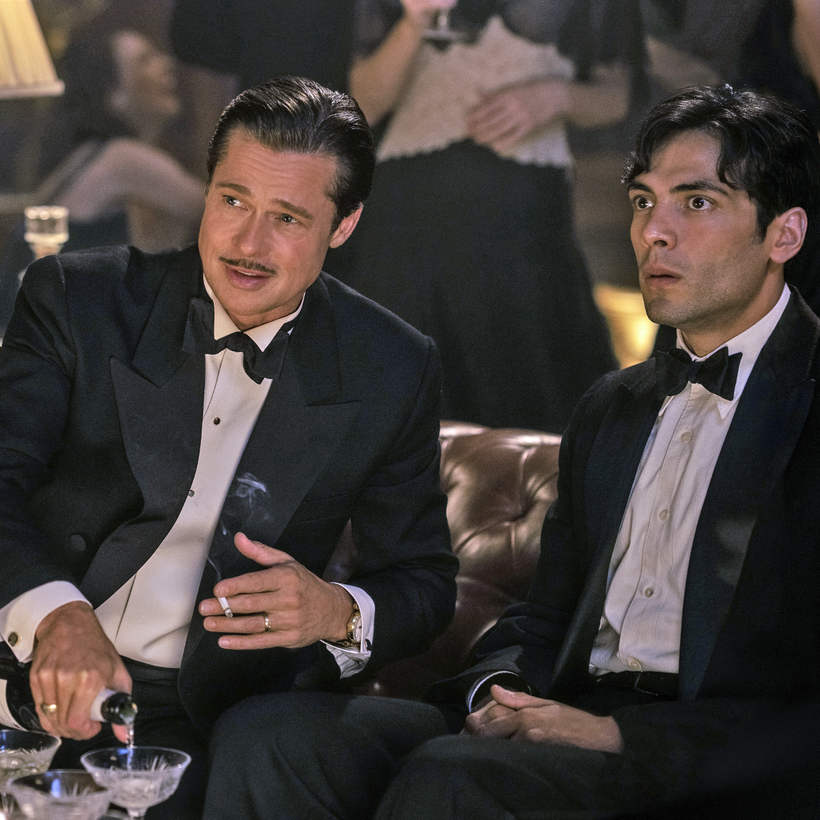Damien Chazelle’s eye-popping satirical epic, Babylon, which stars Margot Robbie and Brad Pitt and hits theaters on December 23, depicts how ruinously decadent Hollywood had become by the time the talkie revolution shook the movie business to its core.
The film’s fluidity is not confined to its spectacular tracking shots. In the first few minutes, a frightened elephant looses a torrent of excrement, cannonball turds included, over one of the men trying to transport the beast to a Pickfair-like mansion, where it’s to provide entertainment at a party in 1926. At the said bacchanal-cum-orgy, a prostitute urinates on a Fatty Arbuckle type before she ODs. Downstairs, a little person cavorting with a three-foot effigy of a phallus shoots a stream of presumably artificial semen at the thrilled revelers.

More emissions follow. To the delight of a degenerate Bugsy Siegel–like gangster (Tobey Maguire), blood spills from the mouth of an ogre in a torture dungeon as he chomps down on a rare (and still breathing) source of protein. The gangster’s bodyguard phlegmatically hawks up phlegm. As talkies decimate ill-equipped stars of the silent era, one major character redecorates a bathroom with blood. Another fires a missile of vomit at the dickey and tux of William Randolph Hearst.
Babylon is clearly less enchanted with the industry town than Chazelle’s musical romance, La La Land. What do these discharges and leakings signify? After a recent Manhattan screening, Chazelle said the film is “a hate letter to Hollywood and a love letter to movies.”

For incidents and characters—such as Robbie’s Clara Bow–like “wild child” and Jean Smart’s amalgam of Elinor Glyn and Hedda Hopper—Chazelle apparently ransacked Kenneth Anger’s scurrilous book Hollywood Babylon (1965), a much-debunked catalogue of Tinseltown scandals. Babylon is therefore built on a swamp. Yet in tracing the progress of a Black jazz musician (Jovan Adepo) and a Mexican studio worker (Diego Calva), who’s hired by Pitt’s revered producer-star, the film is deadly serious in its condemnation of racism in the motion-picture industry.
Pitt’s character (part John Gilbert, part Douglas Fairbanks) is Babylon’s champion of movies for the masses and of the purity of inspiring images. It’s little wonder he falls out with one of his early 1930s wives, a snooty Broadway star, when she suggests he examine a screenplay’s subtext—the literary term sticking in his craw. But this is a Chazelle joke, because Babylon’s subtext, or at least its main visual metaphor, is all that human effluence, the filmmaker’s way of expressing his contempt for prejudice, corruption, and greed in the movie capital—of which the unbridled sybaritism is a symptom.

And not just effluence but a particular portal for it. A close-up of the elephant’s anus is followed by shots of other gaping apertures echoing it—a swirl of booze in a glass seen from above, the mouth of a trumpet. Babylon wouldn’t be the first film to imply that Hollywood is the shithole of the world, but it might be the first to imply it while simultaneously rhapsodizing about the Dream Factory.
Babylon hits theaters on December 23
Graham Fuller is a New York–based film critic

